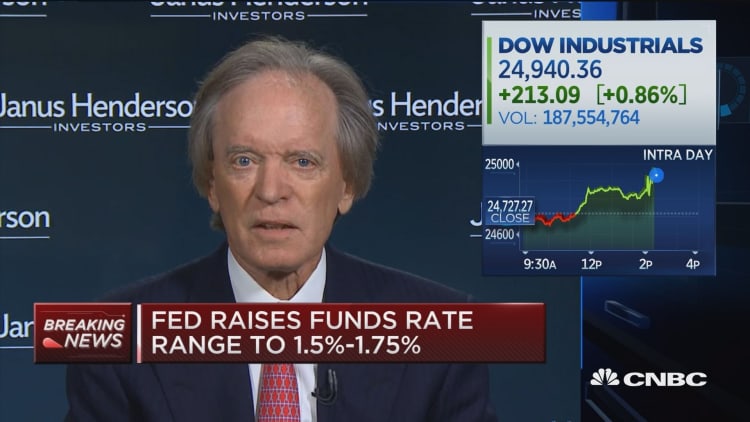
Bond guru Bill Gross told CNBC on Wednesday he doesn't believe the Federal Reserve will be able to raise rates as high as it would ultimately like.
The central bank hiked interest rates on Wednesday by a quarter point, bringing the benchmark funds rate to a range of 1.5 percent to 1.75 percent.
The Fed also upgraded its economic forecast and hinted the path of rate hikes could be more aggressive. It is still forecasting three increases for 2018, but at least one more increase was added in the following two years. The Fed's new forecast for 2020 is 3.4 percent for its federal funds rate.
Treasury yields rose on the news, with the benchmark 10-year note around 2.91 at 3:01 p.m. ET.
However, Gross said he was amazed the bond market didn't react more significantly. To him, that's a sign.
"The market does not believe what the Fed seems to believe in terms of how high they can raise policy rates in the future," he said on "Power Lunch."
He believes the central bank will be "limited going forward" on those hikes.
Gross, who has been calling for a mild bear market in bonds, pointed to what he called the "new normal policy environment" he thinks the Fed will have to consider.
"Nominal GDP at about 4.5 percent has been about 150 basis points higher than 10-year [Treasury] ever since the Great Recession," he said.
"A 3 percent 10-year to me is adequate if — if — the Fed doesn't raise rates by more than two or three times," he added.
As for how to invest in fixed income right now, Gross said it is a "hard predicament."
He suggests keeping it short.
"Reduce your duration relative to your targets. Reduce your average maturity relative to your targets and be satisfied with those short-term rates that are being raised by the Fed at 25 basis points every quarter or so."
— CNBC's Jeff Cox contributed to this report.


